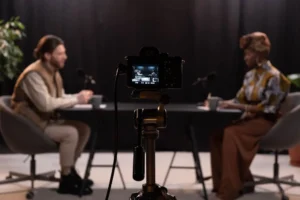Would you like to be more efficient and consistent with your podcasting? If so, you need to know how to batch record episodes.
Batch recordings are when you create multiple podcast episodes in one sitting, rather than recording them in separate sessions. This method is a great way to record efficiently and maintain your podcast publishing schedule. Each recording session will require you to plan carefully, coordinate with your guests, and give yourself enough time to record and edit.
What are Batch Recordings?
Batching tasks is a common productivity technique. It’s usually more efficient to complete several similar tasks in one session than to complete them at different times. For instance, you could spend less time managing your email if you batch it into one session each day, rather than doing it throughout the day, even if you read/write the same number of emails.
This applies to podcasting as well. You can create your content more efficiently if you plan multiple shows worth of content and record episodes in one batch.
Batching recording does not affect your publishing schedule. You’ll continue to publish content at your normal rate – such as once/week, every other week, etc. When you batch record episodes, you simply create the content in one long sitting.
Batch recording works best if you create evergreen episodes. This is content that’s valuable at any time and not tied to a time-sensitive events or topics.
Benefits of Batch Recording
Some of the most prolific podcasters record their episodes in batches. Some record dozens of episodes before the first one publishes.
Before we explain how to batch record episodes, let’s talk about why this a powerful way to create podcast content.
It Keeps You Consistent
If you’re like a lot of podcasters, you’ve published a day late or missed a week entirely. This can disappoint your audience and hurt the growth of your show. It can also set back your next episode.
Batch recording keeps you consistent because you’re always working ahead. You aren’t racing to finish next week’s episode. You’re working on next month’s episode.
More Content Diversity
Batch recording gives you a high level view of your content. It helps you avoid repeating topics or themes because you can see farther into the future.
Pro tip: Plan multiple batches of episodes all at once to keep your content really fresh.
Great for Non-Permanent Setups
Not every podcaster has a permanent studio or computer setup in their home. Some have to hunt for a quiet corner or send the family out of the house for a bit.
If that sounds like you, it might be easier to batch record episodes. You can record all of your content while you have the time and space. You’ll also spend less time setting up and breaking down your equipment.
Easy Schedule Management with Your Co-Host
If you work with a co-host, you may find it hard to coordinate a time to record together, especially if you both have busy schedules. By batch recording, you can set aside one time to produce several weeks (or several months) worth of content.
Better Managed Workload
Setting aside a larger amount of time will help you accomplish larger tasks, as opposed to slowly chipping away at things over time. Plus it’s satisfying to check a lot of things off your to-do list at once.
Bundle Tasks Together to Save Time
We tend to become more efficient with tasks as we repeat them. When you record and edit your episodes in the same session, your brain will fall into a comfortable rhythm that helps you work faster.
For instance, you’ll get pretty quick at slicing out the long pauses in your recordings after you’ve done it 10 or 12 times. You’ll carry that speed through the next 50 or 60 edits.
Great for Interconnected Shows
You should batch record episodes if they are tied closely together. Most multi-part episodes are recorded this way. Part 1 and part 2 are usually recorded on the same day, just published at different times.
This is especially true for some podcast formats, such as non-fictional storytelling or podcast theater. In these cases, episodes like chapters of a book. You have to plan multiple episodes (or an entire season of episodes) before you can start recording, otherwise the narrative won’t tell a good story.
Batch Recording Isn’t for Everyone
This isn’t to say that every podcaster should batch record episodes. This process may not be right for you or your show.
For instance, batch recording usually isn’t right for people who haven’t launched their podcast yet. If you are new to podcasting, it’s best not to get too far ahead of yourself. Instead, focus on making one episode at a time while you gain experience.
Batch recording may not be for you if it doesn’t fit into your schedule. Not everyone has a full day they came to devote to recording.
It also doesn’t make sense to batch record if your podcast content is time-sensitive. You may record something that becomes irrelevant before you get a chance to publish it.
How to Batch Record Episodes
If those benefits sound good to you, here’s how you can batch record episodes for your show.
1. Plan Out Your Content
Your first step is to plan out your content for all of the episodes you intend to record at the same time. If you like to prepare exact podcast scripts, do the same when you batch record episodes.
If you only write brief outlines for your episodes, you’ll want to prepare more than usual. This is because recording three or four episodes in a row is mentally and physically draining. You may struggle to organize your thoughts or make good points after the fourth hour of talking. So it helps to have more information on paper.
Try to think ahead as much as possible when you prepare your notes or script. Consider if there is anything date-specific you should add, like a giveaway you’ll be running or a special upcoming episode.
2. Set Aside a Window of Time
Your next step is to find a time to batch record episodes. Block out a portion of your schedule when you won’t be interrupted. Reserve a quiet space to record. Notify your family, colleagues, or friends to leave you alone during that window. Close your email and turn off your phone.
How much time you’ll need to batch record episodes depends on…
- How many episodes you want to record
- How long it takes you to record an episode
- Your guests’ availability
Most podcasters need at least half a day to record three or four episodes, but you should set aside an entire day for the first time you batch. You’ll get better at batching over time and learn how to fit multiple shows into a smaller window.
Make sure you set your recording day far enough out so you have time to prepare for all of your episodes. The last thing you want is to stay up late preparing for your recording day, or to go into your session unprepared for all your episodes.
3. Schedule a Group of Guests
If you host guests on your show, you’ll need to give each their own time slot in your batch recording session. Schedule them at intervals during your batch recording session so that you have enough time to get through an episode without making your next guest wait around.
Here’s an example schedule. This assumes it takes you 1.5 hours to record an episode, but your time may be different.
- 9:30 AM: Organize thoughts/notes.
- 10:00 AM to 11:30 AM: First guest arrives. Record first episode.
- 12:00 PM to 1:30 PM: Second guest arrives. Record second episode.
- 2:00 PM to 3:30 PM: Third guest arrives. Record third episode.
Notice the 30 minute break between episodes. This is a buffer in case one you run over time with one of your guests. This is helpful if you have a guest who creates great content but likes to speak. It also gives you a chance to review your notes for the next episode.
When you confirm the details of their appearance with each guest, express the importance of logging on or showing up on time. Make it clear that you have an agenda for the day and may not be able to record their episode if they are late.
4. Maintain a Pace, But Don’t Rush
You may have the urge to rush through your recordings to keep your schedule. Or you might speed up as you go because you’re bored or tired. These will diminish the quality of your content. Your listeners will sense your impatience.
Record at your normal, comfortable pace. Pause for a moment if you need to collect your thoughts. If you make a mistake, stop and say it again. (Use the clap technique: Clap your hands near the microphone to create a visual spike in your editing software. This lets you know where to cut.)
5. Edit During Your Batch Session
It’s usually best to edit your episodes right after you record them. This way the topic is fresh in your mind and you can make changes that align with your intentions.
That said, if you’re working under a time constraint or have to get to your next guest, you may want to leave the little tasks for later, such as adding intros and outros or scheduling the episode on your podcast website.
6. Schedule Your Next Batch Recording Session
You’ll feel a massive relief once you get through a batch recording session, but don’t celebrate too long. Rather than take some time off, it’s smarter to get the ball rolling on your next session.
The end of one batch recording session is the perfect time to schedule the next one. Choose a date and time that needs all of the criteria we listed above. Start planning you’re content with this date in mind. Then you can start inviting guests and planning your episodes at a reasonable pace.
Do You Batch Record Episodes?
Batch recording is a powerful productivity method for podcasts, but it’s not the only way to record your episodes. Do you have a unique system that helps you produce quality content? Let us know!


